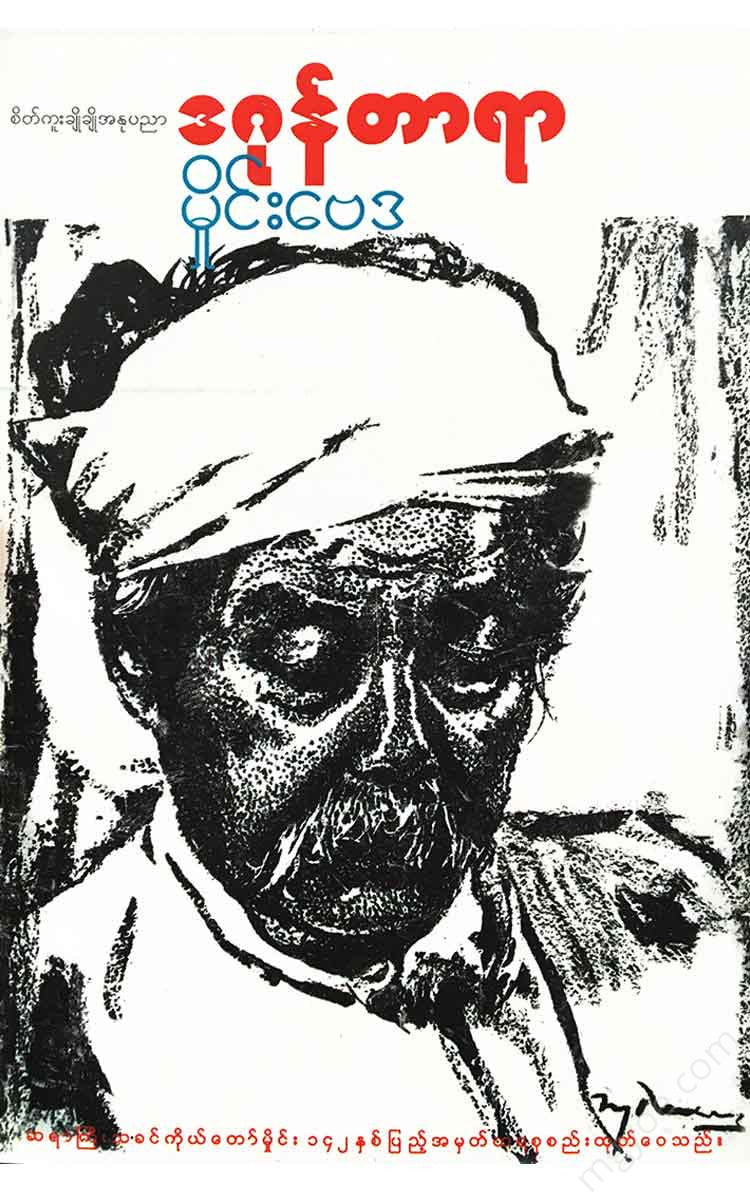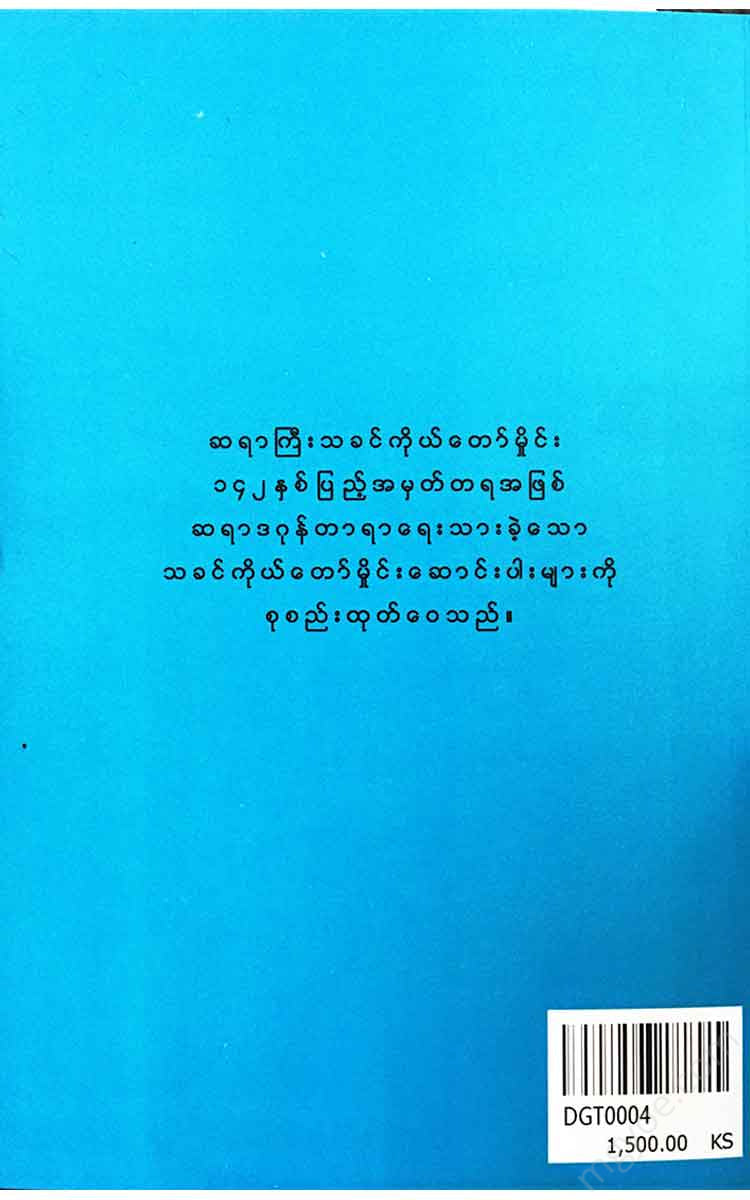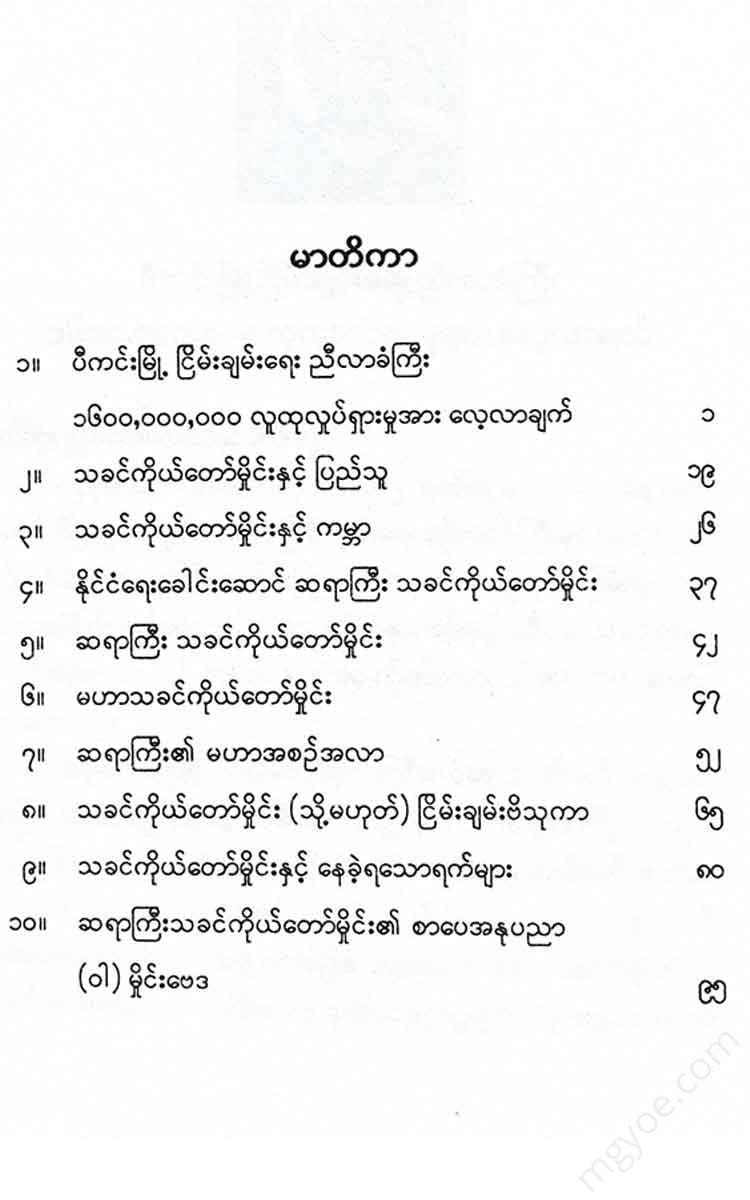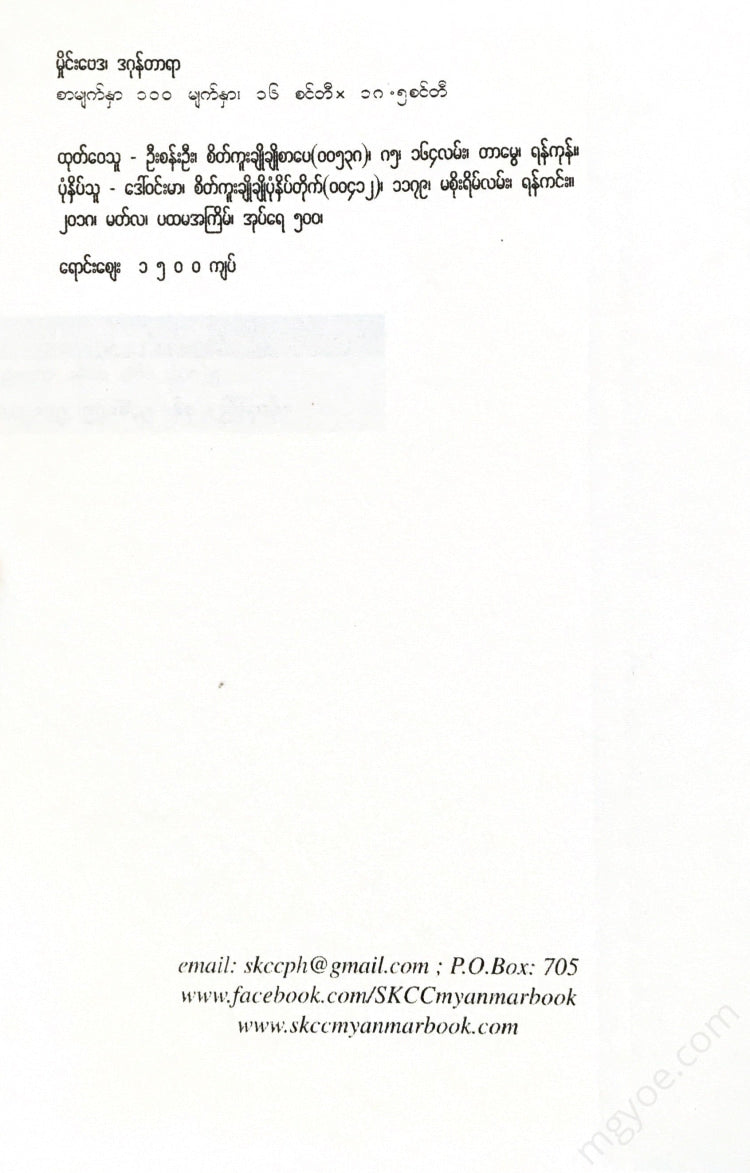စိတ်ကူးချိုချိုစာပေ
Dagontara - Darkness
Dagontara - Darkness
Couldn't load pickup availability
A study of the 1600,000,000 people's movement at the Beijing Peace Conference
Police station, Don Mueang Airport and pickpocketing
The Beijing Peace Conference, held from October 2 to 12, was a major peace conference for people from all over the Asia-Pacific region. Representatives from countries bordering the Asian and Pacific Oceans attended.
Actually, I was supposed to go as a member of the preparatory committee about a week (1) before the conference. The first vice-chairman of the All-Burma Peace Committee, U Htun Aung Kyaw (Chairman of the Writers' Union), was chosen as a member of the preparatory committee. Since he did not have a passport, I was chosen from among the other vice-chairmen.
I also delayed my departure due to “financial” difficulties, and decided to leave on September 27. That same day, I had to go to the immigration office and apply for a “de-registration” form.
The next morning, the plane left from Mingalar Don. We stopped at Don Mueang Airport in Bangkok. There was a delay during the stop. Out of the 28 delegates, only 20 were able to get a flight, and the remaining 8 had to wait for half a day. Since we were to leave for Hong Kong at night, those who had a flight had already gone to a hotel in Bangkok. The remaining 8 were immediately flown to Yangon because they did not have Thai visas. I was one of the 8. Yan Naing Sein laughed and said, “If we go home, we will think we are ghosts.” When we returned to Yangon in the evening, we had to go to the immigration office and apply for a new “de-form” ticket. It was all over by 10 pm.
After talking to another airline, we left on the evening of the 30th, stopped in Bangkok, and flew overnight, arriving in Kowloon (Hong Kong) on the morning of October 1. We went from Kowloon Airport to the Peninsula Hotel, and when we got off at the station, our Chinese friends warned us, “Be careful of pickpockets.” From Kowloon Station, we took a train to Canton (China). We arrived in Canton at night.
That night, it was National Day, and the boats on the Pearl River, lit by bonfires, were rejoicing with the sound of music. The waters of the Pearl River were sparkling with red stars.
War and Peace Festival
The next day, we left Canton by plane at 1:30 p.m. We arranged a flight to catch the conference. There were two Indian delegates who were late on our flight. We arrived in Hong Kong at 5:30 p.m. There was a reception for the Hong Kong Peace Committee, so we had to stay in the airport lounge for about an hour.
In Hong Kong, we found two female delegates from Australia who were just as late as us. They had come by train from Canton. When we left “Hong Kong,” they also came with us on the plane.
Bothadin (Hinsatha) and I had the opportunity to speak to two of the women. Ms. Valen Palmer is from the New South Wales Teachers Union and works as a teacher in Sydney. The other is Mrs. Cassie Corbin, a teacher from Melbourne. They were delayed by passport “difficulties”. Helen and Cassie came separately. Cassie had a British passport and could travel all the way to Hong Kong. Helen went to Jakarta, Indonesia, because the Australian government refused to issue her a passport, and then to Singapore and then to Singapore. From Singapore, she came to Hong Kong. The two
They met in Hong Kong. Although they were women, they were so passionate about peace that they overcame various difficulties and attended the conference.
The dependent and semi-dependent countries attended the conference amidst difficulties and obstacles. Some of the delegates from Japan, unable to obtain passports, had to sneak across to China in fishing boats.
Governments also prevented them from attending the peace conference. Some were even fired from their jobs. (New Zealand's representative, a car worker, was reported to have been fired after the conference.) Yan Naing Sein had to leave the government's film and theater department to attend the conference. There were also people who did not want war. An American soldier donated his Korean War medal to cover the travel expenses of the American representative.
Despite various government obstacles and obstacles, representatives of the people who did not want war traveled many miles to the peace conference.
The plane landed at Beijing Airport at around 9:30 p.m. The previous time, it was evening, and we had seen the red palace and the green trees of Beijing. Now, in the darkness of the night, we could only see the bright lights.
When I got off the plane, I was greeted by the warm light of the audience and the warm photo lights. As soon as I stepped on the ground, the red-necked and lovely girls reached out and gave me the big flowers. I smiled at the Chinese friends I recognized from last year.
A professor stepped out of the crowd and said, “I only read your translation of Gandhara Raje in the morning,” with a smile. As I entered the airport lounge, I heard the song “The World is One.”
We have arrived again in the midst of fragrant Chinese tea, beautiful flowers, and sweet, joyful smiles.
All countries, all people.
This Asia and Pacific Peace Conference was attended by 367 delegates from 37 countries, including 429 observers and guests. Guests from countries such as England, France, Algeria, and Brazil, as well as representatives from the World Peace Headquarters, the World Federation of Trade Unions, the International Federation of Democratic Women, the World Federation of Lawyers, the World Youth Federation, and the Global Student Union.
A study of the 1600,000,000 people's movement at the Beijing Peace Conference
Police station, Don Mueang Airport and pickpocketing
The Beijing Peace Conference, held from October 2 to 12, was a major peace conference for people from all over the Asia-Pacific region. Representatives from countries bordering the Asian and Pacific Oceans attended.
Actually, I was supposed to go as a member of the preparatory committee about a week (1) before the conference. The first vice-chairman of the All-Burma Peace Committee, U Htun Aung Kyaw (Chairman of the Writers' Union), was chosen as a member of the preparatory committee. Since he did not have a passport, I was chosen from among the other vice-chairmen.
I also delayed my departure due to “financial” difficulties, and decided to leave on September 27. That same day, I had to go to the immigration office and apply for a “de-registration” form.
The next morning, the plane left from Mingalar Don. We stopped at Don Mueang Airport in Bangkok. There was a delay during the stop. Out of the 28 delegates, only 20 were able to get a flight, and the remaining 8 had to wait for half a day. Since we were to leave for Hong Kong at night, those who had a flight had already gone to a hotel in Bangkok. The remaining 8 were immediately flown to Yangon because they did not have Thai visas. I was one of the 8. Yan Naing Sein laughed and said, “If we go home, we will think we are ghosts.” When we returned to Yangon in the evening, we had to go to the immigration office and apply for a new “de-form” ticket. It was all over by 10 pm.
After talking to another airline, we left on the evening of the 30th, stopped in Bangkok, and flew overnight, arriving in Kowloon (Hong Kong) on the morning of October 1. We went from Kowloon Airport to the Peninsula Hotel, and when we got off at the station, our Chinese friends warned us, “Be careful of pickpockets.” From Kowloon Station, we took a train to Canton (China). We arrived in Canton at night.
That night, it was National Day, and the boats on the Pearl River, lit by bonfires, were rejoicing with the sound of music. The waters of the Pearl River were sparkling with red stars.
War and Peace Festival
The next day, we left Canton by plane at 1:30 p.m. We arranged a flight to catch the conference. There were two Indian delegates who were late on our flight. We arrived in Hong Kong at 5:30 p.m. There was a reception for the Hong Kong Peace Committee, so we had to stay in the airport lounge for about an hour.
In Hong Kong, we found two female delegates from Australia who were just as late as us. They had come by train from Canton. When we left “Hong Kong,” they also came with us on the plane.
Bothadin (Hinsatha) and I had the opportunity to speak to two of the women. Ms. Valen Palmer is from the New South Wales Teachers Union and works as a teacher in Sydney. The other is Mrs. Cassie Corbin, a teacher from Melbourne. They were delayed by passport “difficulties”. Helen and Cassie came separately. Cassie had a British passport and could travel all the way to Hong Kong. Helen went to Jakarta, Indonesia, because the Australian government refused to issue her a passport, and then to Singapore and then to Singapore. From Singapore, she came to Hong Kong. The two
They met in Hong Kong. Although they were women, they were so passionate about peace that they overcame various difficulties and attended the conference.
The dependent and semi-dependent countries attended the conference amidst difficulties and obstacles. Some of the delegates from Japan, unable to obtain passports, had to sneak across to China in fishing boats.
Governments also prevented them from attending the peace conference. Some were even fired from their jobs. (New Zealand's representative, a car worker, was reported to have been fired after the conference.) Yan Naing Sein had to leave the government's film and theater department to attend the conference. There were also people who did not want war. An American soldier donated his Korean War medal to cover the travel expenses of the American representative.
Despite various government obstacles and obstacles, representatives of the people who did not want war traveled many miles to the peace conference.
The plane landed at Beijing Airport at around 9:30 p.m. The previous time, it was evening, and we had seen the red palace and the green trees of Beijing. Now, in the darkness of the night, we could only see the bright lights.
When I got off the plane, I was greeted by the warm light of the audience and the warm photo lights. As soon as I stepped on the ground, the red-necked and lovely girls reached out and gave me the big flowers. I smiled at the Chinese friends I recognized from last year.
A professor stepped out of the crowd and said, “I only read your translation of Gandhara Raje in the morning,” with a smile. As I entered the airport lounge, I heard the song “The World is One.”
We have arrived again in the midst of fragrant Chinese tea, beautiful flowers, and sweet, joyful smiles.
All countries, all people.
This Asia and Pacific Peace Conference was attended by 367 delegates from 37 countries, including 429 observers and guests. Guests from countries such as England, France, Algeria, and Brazil, as well as representatives from the World Peace Headquarters, the World Federation of Trade Unions, the International Federation of Democratic Women, the World Federation of Lawyers, the World Youth Federation, and the Global Student Union.







